Neem Oil is something that you have probably heard about if you are a gardener or someone who has a passion for plants. But, what exactly is Neem Oil? And more importantly, what does this have to do with plants in the first place? Neem oil is derived from neem, which should come as no surprise given the name. Neem, also known as Azadirachta Indica, has been used for many years as a medicinal plant. In this article, learn how to use neem oil with plants.
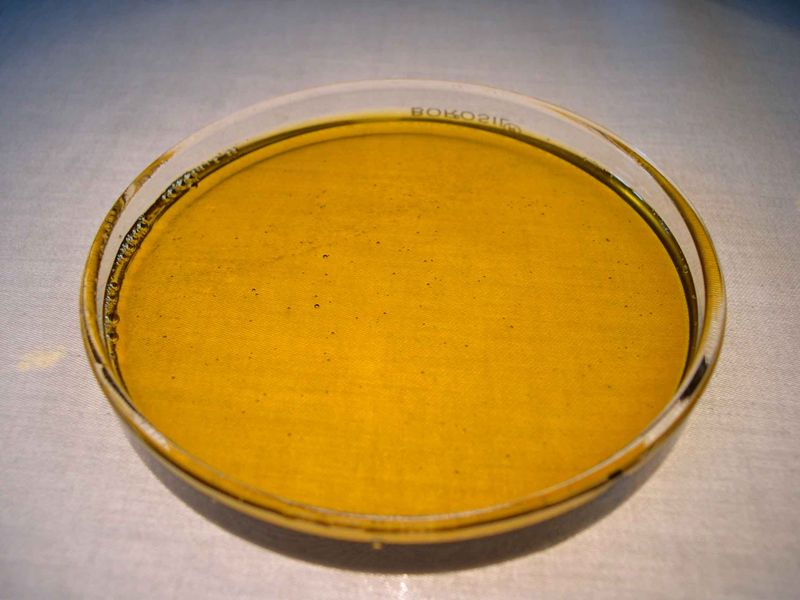
Neem Oil is a natural herbaceous insecticide that repels insects, enhances plant health, and protects plants against disease.
It is native to India, Sri Lanka, and Burma, and the seeds of the neem plant are used to make neem oil. In traditional medicine, the oil has been used to treat various ailments, allergies, and infections, and it also makes an excellent and strong organic insecticide.
Neem oil is effective against a wide variety of garden pests, including spider mites and nematodes, as well as aphids, mealybugs, whiteflies, Japanese beetles, leafhoppers, thrips, and fungus gnats.
Neem oil can also kill various fungi responsible for multiple plant diseases, including leaf spots, black spots, scabs, anthracnose, and powdery mildew.
Sounds useful? Read on to find out more…
What Is Neem Oil?
Neem oil is pressed out of the seeds of the neem tree. The oil has a brownish or yellowish color to it and smells strongly of garlic and sulfur.
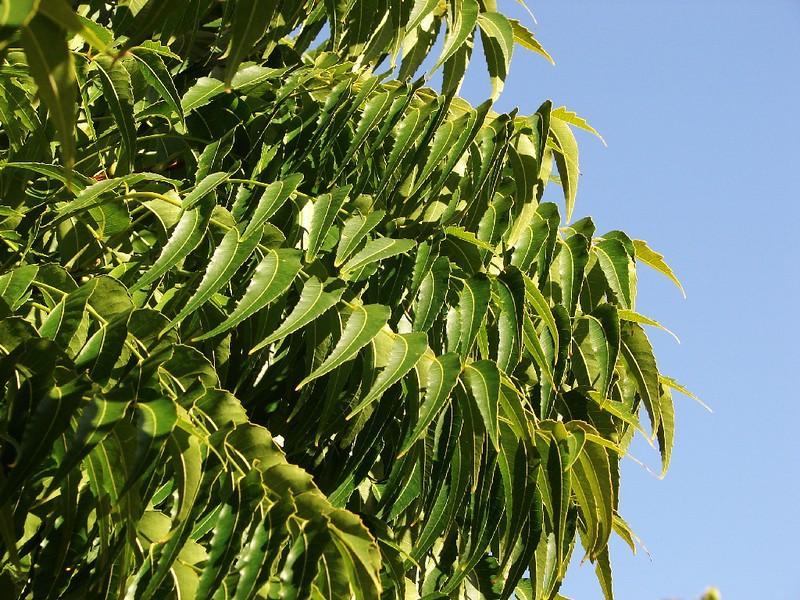
Neem oil is a type of natural insecticide that can be extracted from the seeds of the neem tree.
It has been used to eradicate plant diseases and pests for hundreds of years. And even today, neem oil is used in a wide variety of products, including cosmetics, pharmaceuticals, and personal care items.
These items also include things like shampoos for pets, soaps, toothpaste, and so on. About one thousand physiologically active compounds are said to be present in neem oil.
Some of these compounds are azadirachtin, Nimbin, meliantriol, salannin, and fatty acids. Out of all these, azadirachtin is the most powerful insect repellent and killer.
Related: How to Use Neem Oil for Plants as an Organic Pesticide? Plus, Amazing Benefits!
How Is Neem Oil Extracted?
The neem tree will not begin bearing fruit until at least five years have passed since its germination, and it will not reach maturity until the age of twelve. A young tree that is only five years old can produce anywhere from five to twenty-five kg of fruit. However, a fully mature tree has the potential to produce 35 to 50 kilograms of fruit annually.
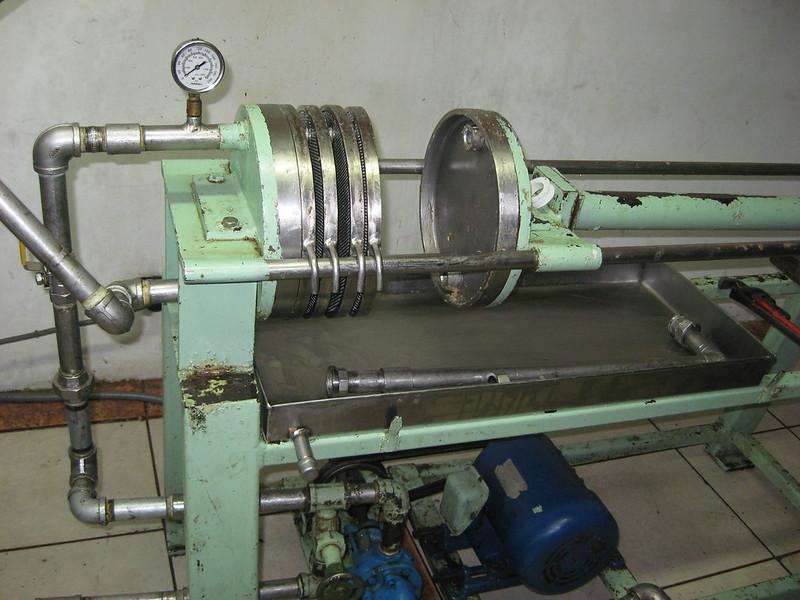
A machine that is used in the process of oil extraction via cold pressing.
The amount of oil extracted from the seed can range anywhere from 40 to 45% of the dry weight of the seeds. The amount of rain that falls in the area significantly impacts the oil content of the seeds, and higher levels of precipitation result in higher oil content.
Neem oil can be extracted from neem seeds by a process known as cold pressing, which involves either pressing or crushing the neem seeds. During this process, ethanol is utilized as a solvent which, among other reasons, offers a soluble and sterile extraction environment, which, in turn, enables a high level of solubility in the desired products.
After that, the mixture containing the Neem oil is distilled at a temperature of 65 degrees Celsius until it is totally free of the solvent. After the extraction, it is refined using diethyl ether and then exposed to the air to remove the solvent’s smell.
How Does Neem Oil Work?
Because of its minimal toxicity for both humans and insects that are valuable to our ecosystem, neem oil is often regarded as the most humane and effective botanical insecticide. It is classified as a contact insecticide, which is a type of insecticide that must be sprayed directly onto the plant’s foliage in order for it to take effect.

Neem oil disrupts insect hormone systems, making it difficult for insects to grow and produce eggs.
The primary mechanism by which neem oil works against pests is that it prevents insects from feeding. However, there are other mechanisms as well, such as disrupting growth and development in insects by affecting hormone function, sterilizing insects in the early stages of their lives, and lowering reproduction and development in insects.
The chemical azadirachtin in neem oil has outstanding insecticidal properties as it disrupts the hormones involved in metamorphosis, causing the insect to deform at some stage of its life cycle before ultimately killing it.
Studies have indicated that this substance can disrupt the process of mitosis, which is the method by which living cells duplicate themselves. In addition to this, it has a detrimental effect on the cells of the digestive tract as well as the muscles and fatty tissues, which ultimately leads to the death of the pests.
Plants That Neem Oil Can Be Used On!
Neem oil is completely safe for use on the vast majority of plant varieties. Among these are the Ficus Audrey, the Monsteras, the Ferns, the Philodendron, the Snake Plant, the Pothos, and the Zamioculcas zamiifolia. There are, however, several plants to avoid when spraying neem oil. This contains cacti, succulents, calathea, and other related plant species.
These plants are exceptionally well suited to dry environments, as their tissues can accumulate and release large amounts of water. These plants can store water in their fleshy stems and leaves. Since these plants are sensitive to wet conditions, neem oil must be used cautiously while spraying.
When To Spray Neem Oil On Your Plats?
Neem oil has multiple applications, including protection against and managing plant diseases and parasites. If you notice tiny holes in the leaves of your plants, sticky secretions, or webbing, then your plants likely have an infestation. Flowers, fruits, and leaves can all be infested with pests, as can the spaces between the leaves.
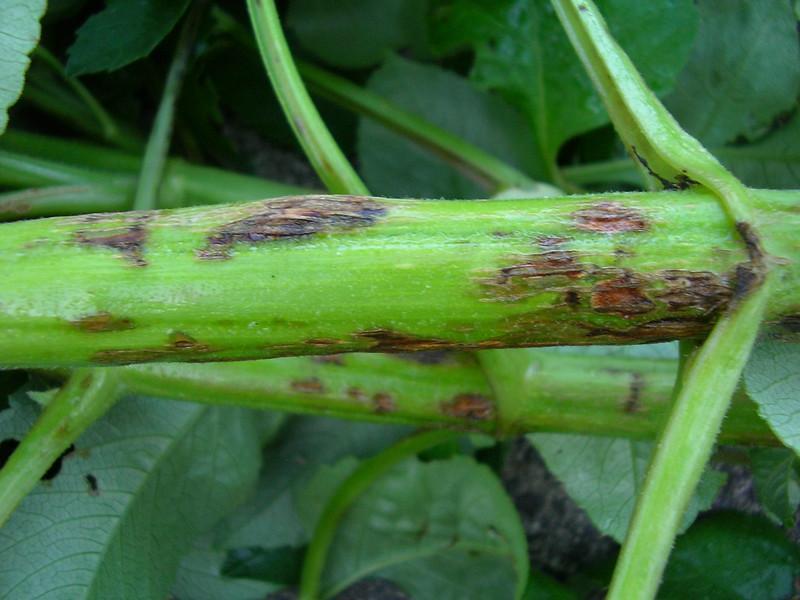
While plants are actively growing, you can apply neem oil as a pest repellent or to manage infestations.
During these situations, neem oil can help! Neem oil has been shown to be effective against a wide variety of pests, including thrips, aphids, spider mites, whiteflies, fungus gnats, and mealybugs. When insects consume the leaves treated with neem oil, they are killed by the compound azadirachtin, which possesses miraculous insecticidal properties.
Even if your plants have no pest problems, you can still use neem oil as a preventative step. For instance, if your plants have been plagued recently or you live in a hot and humid area, we would advise spraying them once a week.
How To Apply Neem Oil?
Neem oil can be applied topically as a preventative strategy or therapy for an existing infestation. However, the amount to be sprayed and the time interval between applications is not the same in either scenario. It is essential to point out that neem oil becomes unstable when exposed to direct sunlight. So, to maintain the effectiveness of the sprays, they must be applied to the plants either very early in the morning or late in the evening.

When spraying plants with neem oil, it’s best to do it twice: once in the evening and once in the morning.
Neem Oil As Preventive Treatment
If you want to use neem oil as a preventative step, you should combine one to two tablespoons of neem oil with one gallon of water and stir well. Put this solution in a spray bottle, and then add one spoonful of soap to the bottle so that neem oil can be dissolved in. Give the ingredients a good shake so that they can blend together evenly.
After you have watered your plants, spray the leaves thoroughly with insecticide because that is where most of the pests will be found feeding. As soon as you have finished spraying the leaves, you can go on to treat the stem and the soil.
This is because some pests, rather than attacking the plant itself, eat on its stem before hiding in the soil to feast on fungi and other organic debris. Spray the area with neem oil once every two weeks to keep the pests away from your plants.
Neem Oil As Pest Control
You first need to separate the infested plant from the other plants in the garden. This will prevent the pest from attacking plants that are located nearby. In order to maintain the insecticidal effect of neem oil, store it in a room with low lighting and keep it out of direct sunshine. After that, get a water hose and softly mist the plant.
It will temporarily get rid of the majority of the insects that are on the plant. After that, spray the neem oil on the plant, beginning at the foliage and working your way down to the stem and soil. On the second or third day, leave your plant outside in an isolated spot so that it might recover some of its strength by basking in the sunlight.
You should repeat the method once or twice every week until all the bugs have been eradicated and there are no new signs of pest damage on your plants.
Related: How To Get Rid Of Tiny Clear Worms In The Soil For Good?
Can I Eat Plants Sprayed With Neem Oil?
You may be asking, now that you have successfully eradicated the pests that were causing damage to your plants by spraying them with neem oil, whether or not it is safe to consume the fruits and vegetables that have been grown on plants that have been treated with the oil.

Applying neem oil to vegetables and other edible plants is generally considered safe.
The response to that question will be different depending on which type of neem oil you put on these plants. The product’s packaging will tell you if the manufacturer of the neem oil added any other components to it that could be dangerous to your health.
So, always make sure to check the label for any warnings or instructions regarding safety. Consuming low doses of pure neem oil that have not been tainted by the addition of any other potentially dangerous substances is generally seen as safe. In fact, many of the things we use every day, from medicine to cosmetics, have it as an ingredient.
Also, keep in mind that neem oil has a potent odor and a bitter taste in your mouth.
Spraying a week or two before harvest or washing the produce is recommended to prevent a bitter aftertaste. Vegetables treated with neem oil may also aggravate allergies in those who are sensitive to the substance.
Benefits Of Using Neem Oil!
Neem oil is an insecticide that is both effective and safe, and it can be used to manage and prevent pests. Also, using neem oil as a pesticide has several benefits, some of which are listed below.
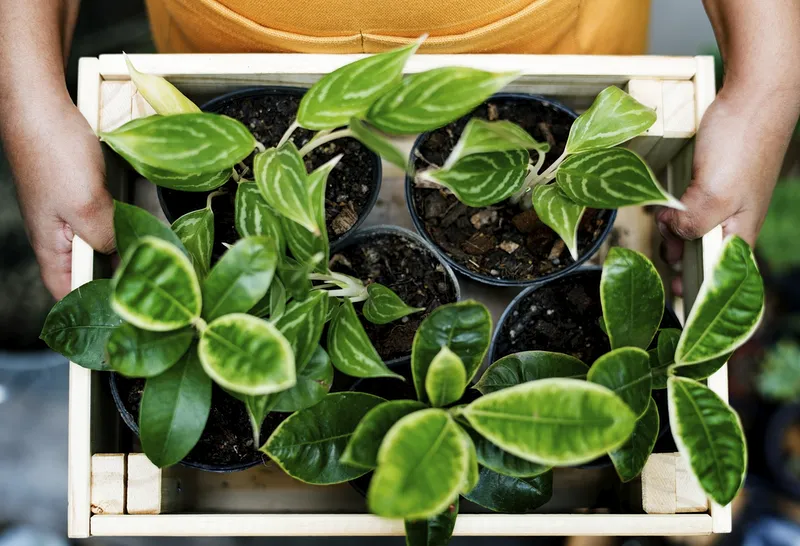
Both pests and fungi may be controlled using neem oil, making it a useful addition to any garden.
Neem Oil Is Organic
The seeds of the neem fruit are used to obtain neem oil. Since it is organic in nature, it is biodegradable and does not pose a danger to the environment. According to the Environmental Protection Agency (EPA), neem oil is entirely harmless to the natural areas and has no significant negative impacts on beneficial insects.
Safe For Pets And Wildlife
The residue that is left behind by synthetic pesticides is hazardous, and it can cause harm or even death to animals and pets in the surrounding area. Neem oil, on the other hand, is safe to use and does not produce harmful byproducts.
So, when applied to plants, it won’t harm any animals, including humans, fish, birds, and other livestock that may be in the area.
Safe For Beneficial Earthworms
Earthworms are important to garden soil. They dig tunnels in the soil that allow air and water to flow through them. Their excretions contain nutrients that further add up to the ground and fertilize it. Synthetic pesticides kill earthworms, while neem oil does not harm them but instead encourages their activity.
Increase The Shine Of The Leaves
Neem oil prevents pest infestation and enhances the appearance of the plants it protects. As a result of neem oil’s capacity to reflect a specific wavelength of light, plants that have been sprayed with it appear bright, shiny, and dust-free. However, this does not affect the rate at which plants produce oxygen through photosynthesis.
Action Against Nematodes
Gardeners might have a tough time dealing with nematodes since they are harmful but also problematic to get rid of. Neem oil is highly successful at eliminating root-knot nematodes, which are widely regarded as the most detrimental to plants. Neem oil kills these worms by preventing the nematodes’ larvae from developing into adults.
Neem Cakes As A Fertilizer
The neem oil extraction process results in the production of neem cake. This organic product acts as a pesticide as well as a fertilizer for the garden. Neem cake has a high concentration of nitrogen as well as substances that kill insects, which revitalizes the soil and assists in the management of grubs, white ants, and nematodes.
Neem Oil As A Fungicide
Neem oil destroys insects and other pests and helps get rid of the fungus. Powdery mildew is one of many fungal diseases that can be treated with neem oil. Other fungal diseases that can be treated with neem oil include black spots, rust, scab, leaf spot, tip blight, and anthracnose. Neem oil is usually applied once a week until the fungus is gone.
Related: What Are These Orange Bugs On My Milkweed Plants? Harmful Or Beneficial?
Side Effects Of Using Neem Oil!
Neem oil is, without a shadow of a doubt, a gift from mother nature to all of us plant enthusiasts and gardeners. However, some attributes of neem oil are undesired and can be classified as potential adverse effects.
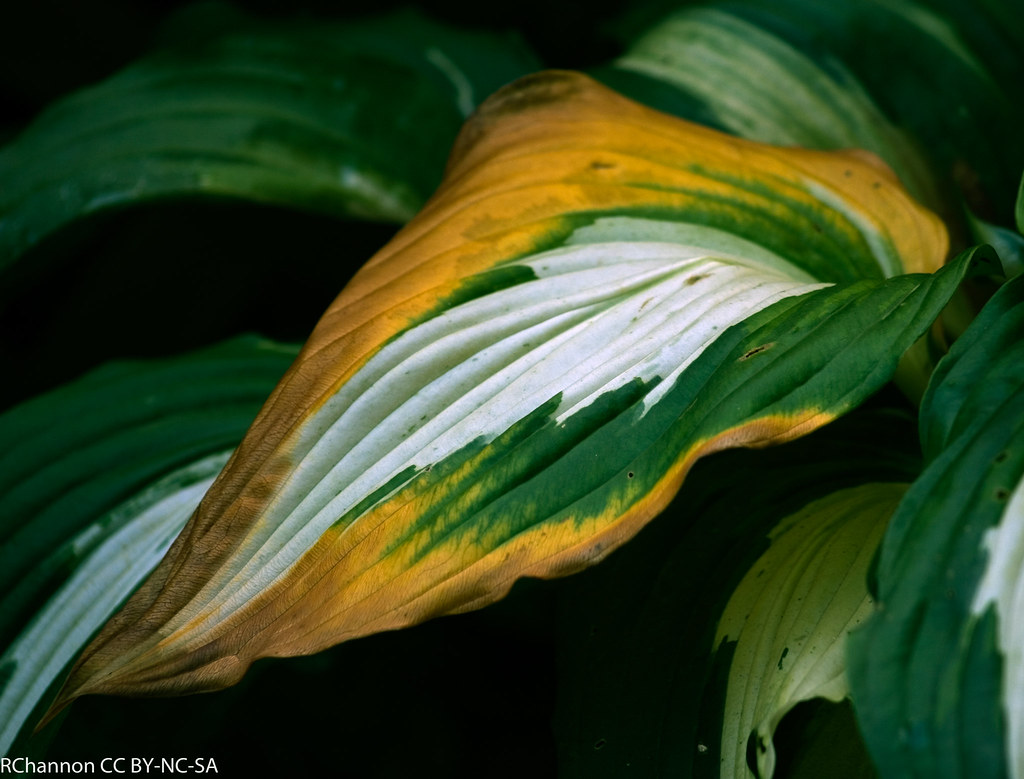
Neem oil can cause burns to the foliage of plants, regardless of the type of plant being treated.
It Burns Leaves
Some plants, especially those that are hypersensitive to neem oil, may suffer harm to their leaf tissue as a result of this. In some situations, excessive amounts of neem oil might even cause burns on the foliage of a plant. Therefore, before spraying the entire plant with the neem oil, perform a spot check on one or two leaves and wait a few hours to make sure there are no indications of any adverse effects.
It Has A Strong Odor
Neem oil purified by cold pressing has a very potent odor similar to the scent of garlic and sulfur combined. Many people find it unpleasant. Immediately after using the spray, the grass on your lawn and the air in your living room may smell like sulfur.
The scent will be gone within a day or two, but if you get too close to the plants, you might still be able to pick up traces of it.
It Might Harm Beneficial Bugs
Although neem oil is the most useful insect-friendly organic insecticide available, if sprayed directly on pollinators like bees, it can still harm them. Therefore, before applying neem oil, it is necessary to wash the plant with the water hose to eliminate the bugs, even the beneficial bugs, so that they can be shielded from the direct spray.
Where To Buy Neem Oil?
When it comes to purchasing neem oil for your plants, you have many choices available to you. Allow us to guide you in making the best decisions for you.
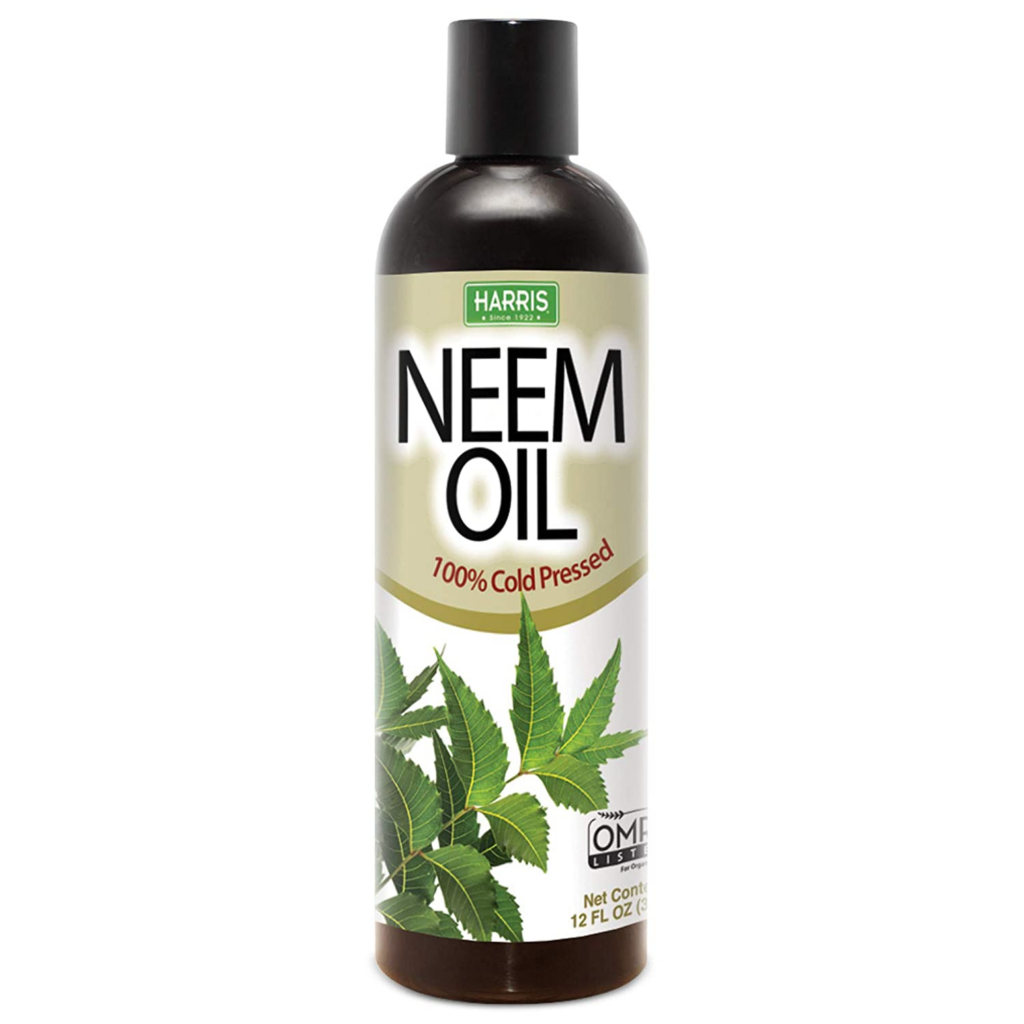
Neem oil can be bought easily from your local gardening store or any online retailer such as amazon.
Neem Oil Extracted By Cold Press Method
There is no competition when it comes to the quality of the pure cold-pressed neem oil. So, when you go shopping for neem oil, your first priority should be to find a brand that only uses cold pressing. Compared to other, more watered-down kinds, it could be a bit more expensive. However, you will achieve the very best results by using it on your plants.
If you cannot locate it in your neighborhood store or are simply not in the mood to go, you may have Amazon deliver it right to your front door. Both Harris Neem Oil and 100ml Neem Oil Premium are at the top of my list of recommended products.
Due to their potency, you’ll only need a small amount every time you spray. Therefore, even if you use the product very frequently, a bottle should last you the whole year.
Clarified Hydrophobic Extract & Azadirachtin Extract
After the neem seeds have been processed, two byproducts, azadirachtin extract and clarified hydrophobic extract are created. These products include a relatively low amount of the many valuable chemicals that function as insecticides in the neem oil.
This is not useful because we had it in mind to create an insecticide; nevertheless, it may still be suitable for specific general applications, such as making cosmetics and soaps.
Conclusion
If you give your houseplants the care they need by providing them with adequate lighting, the appropriate amount of water and fertilizer, and soil draining well, you shouldn’t have to worry too much about pests.
Neem oil, on the other hand, is an effective natural insecticide that should be kept on hand in case spider mites or aphids make their way to your plants despite all the care and precautions.
Neem oil can be used to treat more minor infections with cotton that has been dipped in neem oil. However, when dealing with severe infections, it is recommended that a neem oil spray be prepared. However, before spraying an entire plant with neem oil, you should always do a test on a tiny portion of the plant first.
Frequently Asked Questions
Which Plants Do Not Like Neem Oil?
Spraying neem oil on plants with thin or wispy leaves, such as peas, arugula, lettuce, and spinach, should be done with extreme caution because it can inflict burns on the plant’s foliage.
In addition, you shouldn’t use neem oil on herbs like dill, marjoram, basil, caraway, cilantro, oregano, parsley, or thyme. These herbs are particularly susceptible to damage from the neem oil.
Can I Spray My Plants With Neem Oil Every Day?
Spraying your plants with neem oil on a daily basis is not advised. Not even diluted neem oil. To help prevent pests and get rid of existing ones, spraying plants with neem oil is the best option. However, avoid spraying directly into the sun; your plants will thrive.
How Often Should I Spray Neem Oil on My Plants?
As Neem Oil takes time to take effect, you’ll need to clean and treat your plants multiple times over several days. Pests can be eradicated and fungal problems prevented by applying neem oil insecticide once a week. Use as you would any oil-based spray, coating the leaves thoroughly and paying extra attention to areas with the worst infestation.
Can I Use Neem Oil on All Plants?
Neem Oil can be applied to most plants; however, it will not be as effective on plants that do not have smooth surfaces. For example, it won’t be effective if your plants have fur, needles, or other features that allow bugs to crawl deeper into the leaves and avoid their effects.
When Should You Not Use Neem Oil?
Neem is typically considered to be non-toxic, but when you are eating fresh vegetables, you do not want to receive a mouthful of it—applying the neem at least a day before harvesting will prevent this from happening. In addition, because neem oil is typically diluted with warm water, using it in the middle of the day increases the likelihood of foliage burns.
Do You Spray Neem Oil on Soil or Leaves?
When applying neem oil to a plant, whether as a cure for pests or as a preventative precaution, it is essential to cover both the top and bottom of the plant’s leaves, this is because insects like to congregate on the bottom of plant foliage.
You should also give the stems and the soil a little coating, just in case any creatures have found their way to all those places.
Does Rain Wash off Neem Oil?
Even though neem oil will be removed from most plants when it rains heavily, little rainfall may cause some residue on the leaves undersides. For this reason, neem oil should be sprayed quickly after rain once the plant has had the opportunity to dry up thoroughly.
Sources For Further Reading
What should neem be used for on plants? (2020). Retrieved 2 October 2022, from https://extension.unh.edu/blog/2020/01/what-should-neem-be-used-plants
Pesticide Information about neem oil – UC IPM. (2022). Retrieved 2 October 2022, from http://ipm.ucanr.edu/TOOLS/PNAI/pnaishow.php?id=53
Horticultural Oils – What a Gardener Needs to Know | University of Nevada. (2022). Retrieved 2 October 2022, from https://extension.unr.edu/publication.aspx?PubID=3029
Insect Control: Horticultural Oils – 5.569. (2022). Retrieved 2 October 2022, from https://extension.colostate.edu/topic-areas/insects/insect-control-horticultural-oils-5-569/
Editor’s Recommendations
How To Get Rid Of Thrips From Your Garden For God? The Ultimate Guide
How To Get Rid Of Aphids On Your Milkweeds For Good? The Ultimate Guide







